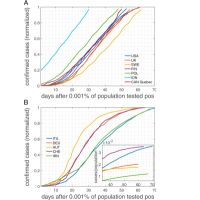It is estimated that healthcare frontliners, whose work exposes them to patients with the new coronavirus, could account for 10-20% of all COVID-19 diagnoses. However, the incidence of COVID-19 infections among healthcare workers is mostly based on cross-sectional data, with little information on individual-level risk factors.
You might also like:Silent Transmission as Pandemic’s Driving Force
A new study (Nguyen et al. 2020) of more than 2 million individuals (ie, healthcare workers and the general community) in the U.S. and Britain, offers important insights on how work-related factors, including availability of personal protective equipment (PPE), and ethnic background can impact risk of infection among frontline workers.
The prospective, observational study, performed by researchers from Harvard, MIT, Massachusetts General Hospital, Brigham and Women’s Hospital, King’s College London, and University of Hong Kong, utilised self-reported data from the COVID Symptom Study smartphone app. Study participants were voluntary users of the app through which their demographic data (age, sex, race or ethnic background, etc) were obtained. Participants also used the app for reporting any COVID-19 symptoms and/or diagnostic results.
From in-app data gathered between 24 March and 23 April 2020, the researchers found that:
- Frontline healthcare workers had at least a threefold increased risk of COVID-19 infection compared with the general community, even after accounting for other risk factors.
- Black, Asian, and minority ethnic healthcare workers had at least a fivefold increased risk of being infected, compared with the non-Hispanic white general community.
- Reuse of PPE or inadequate PPE among frontline workers were associated with a higher COVID-19 risk.
- Non-white healthcare workers were disproportionately affected by inadequacy of PPE and were more likely to work in clinical settings with greater exposure to patients with COVID-19.
In addition, even with adequate PPE, medical workers attending to COVID-19 patients remained at increased risk of infection. This particular finding, the researchers note, underscores the importance of ensuring PPE quality and availability, as well as correct application and removal of PPE and clinical situation (practice location). Adherence to other infection control measures is also advised.
The results of this study point to the "possibility for healthcare workers to perpetuate infections or contribute to community spread, particularly when asymptomatic or mildly symptomatic, and justify calls to increase testing to reduce hospital-based transmission," according to the research team.
Additional studies investigating modifiable risk factors for healthcare worker-related infection are needed to support the observational findings in this study, the research team added.
Source: The Lancet
Image credit: Samara
Heisz via iStock



























